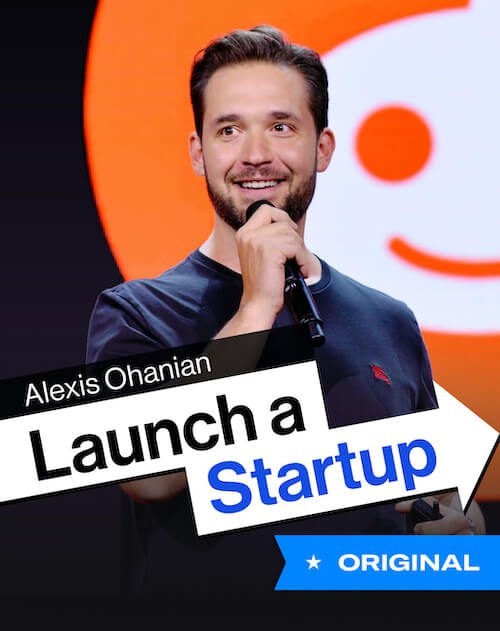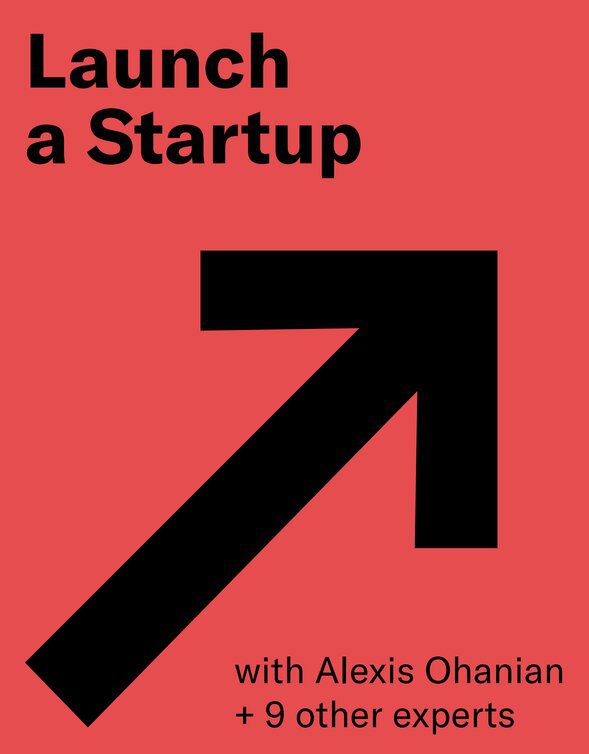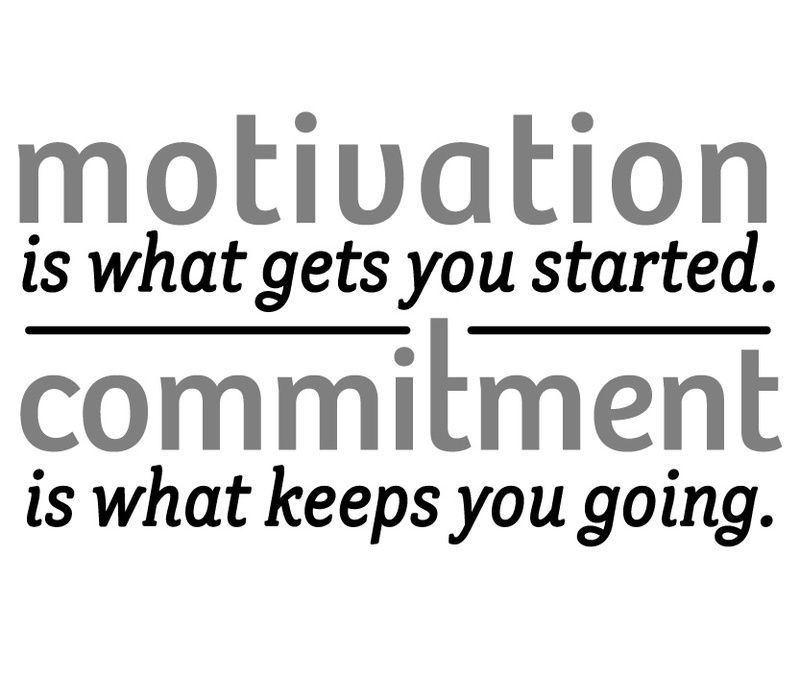Knowable’s How To Launch a Startup is a tactical, step-by-step guide designed to take you through the process of launching a high-growth startup — forged from the feats and foibles of the folks who’ve been there. The course takes you through the brass tacks of the startup cycle — an A to Z immersion into the lessons sure to impact every would-be founder.
Course Experts
Alexis Ohanian
Alexis Ohanian is the co-founder of Reddit, one of the world’s most influential websites, and Initialized Capital, a VC firm with investments in companies like Instacart and Coinbase.
Michael Preysman
Michael Preysman is the founder and CEO of Everlane, a modern essentials fashion retailer challenging incumbents like J. Crew and Banana Republic.
Eddy Lu
Eddy Lu is the co-founder of GOAT, a category-defining sneaker retailer that raised $100M from Foot Locker in 2019.
Tracy Lawrence
Tracy Lawrence is the co-founder and CEO of Chewse, a food catering company rewriting the rules of company culture.
Ben Jacobs
Ben Jacobs is the co-founder of Whistle, the “Fitbit for dogs” acquired by Mars Petcare for more than $100M.
Greg Bettinelli
Greg Bettinelli is a Partner at Upfront Ventures, the VC powerhouse behind companies like Bird, Ring, and FabFitFun.
Éva Goicochea
Éva Goicochea is the co-founder and CEO of Maude, a Vogue-touted startup reframing the conversation around sex.
Peter Werner
Peter Werner is a partner at top Silicon Valley law firm Cooley LLP, where he’s worked with startups like Allbirds, Opendoor, and Salesforce.
Warren Shaeffer
Warren Shaeffer is the co-founder and CEO of Knowable. Together with his co-founder, Alex, he’s raised over $12M from leading venture capital firms and scaled products used by 100M+ people.
Alex Benzer
Alex Benzer is the CPO and co-founder of Knowable and previously held the same roles at Vidme.
Ryan Duffy
Ryan Duffy is a member owf the founding team of Knowable and the writer of this course. Nancy Miller Nancy Miller is an editorial director at Pop-Up Magazine and former editor at WIRED and Fast Company.
Here are my favourite take aways from listening to Knowable’s How To Launch a Startup:

Are You Founder Material?
The two key attributes every successful founder must possess:
vision and relentless optimism. Diagnose a stubborn problem, believe in your solution, and be able to communicate it effectively to your employees, customers, and investors. Confidence is contagious.
Common fears and misgivings
“I don’t have enough money to start a company.”
Good news: it’s never been less expensive to get a company off the ground. There are countless variables that factor into a business’ basic bottom line, but as a rule of thumb, you should expect to spend at least five thousand dollars in your first year for the most basic of bootstrapped products.
“I don’t have an idea.”
The idea is merely a starting point. Most rookies overemphasize the importance of the world-changing idea, but it’s process that’s paramount — the execution and evolving iterations of your idea. It’s likely the key components of your idea will change as you learn more about your users and the problem you’re solving.
“I don’t have any business training.”
Formal business training isn’t required to start a business — the nuts and bolts of business operations can be learned as you go. In the early stages of this work, your focus should be on understanding your customer, building your product, and getting it in front of as many people as possible.
High-growth Startups
High-growth startups are scaleable
What separates a high-growth startup from the average small business is the concept of scalability — meaning, the cost of producing a single unit of a product or service must decrease over time, so that each additional dollar of revenue costs less than the previous one. It’s the difference between the business models of your corner dry cleaners and, say, “Uber for dry cleaning.”
Why startups fail
The wrong team.
A team lacking in essential skills, business expertise, or a shared vision doesn’t have a good chance to succeed.
Poor concept.
his includes a misunderstanding of the market, an inability to monetize, or a naiveté to legal obstacles
Founder conflict.
Ambiguous responsibilities and expectations, company direction, share ownership — all common areas of conflict among business partners. Talk to a lawyer early to get ahead of these issues by documenting ownership and setting expectations at the very beginning of the business journey.
Poor execution.
Even great ideas can fall prey to misfires in product development, sales, marketing, financing, operations, HR, and more. If your product or service blows the competition out of the water, you’re in pretty good shape. If not, your path might be rockier.
Financial pressure.
Lack of cash to cover operations usually spells doom. Access to capital frees teams to build how they want to. Founders who invest their own money have an extra incentive to succeed — this is something investors like to see, but do so at your own peril.
Your Idea
Generating product ideas
There’s no science to inspiration, but consider the following if you’re struggling with your big idea.
Mine your frustrations.
The best businesses solve problems — why not solve your own? The seeds of many great companies have been sown by a founder encountering something personally annoying — and deciding to fix it themselves.
Consider your own interests and hobbies.
Leave room for your personal taste for ideas — you’ll likely find more satisfaction in building something you would use yourself.
Find your people.
Community matters. Seek out work that inspires you, and introduce yourself to the people who are making it happen. Not only can you forge valuable connections, it can also be a tremendous source of support and inspiration.
Switch it up.
Disrupt your personal routine. When you expose yourself to new people, places, and experiences, it helps expand your perspective.
Read. Widely and deeply.
Be insatiably curious about the things that interest you.
Travel.
If you have the budget for it, leave your city, leave the country, leave your comfort zone. Sometimes the best way to get inspired is by getting lost.
Competitive Analysis
A competitor is any other product a user might reasonably choose in place of your own
The fundamentals of competitive analysis
Identify your competitors.
An understanding of the competition is an essential ingredient of both your offensive and defensive business strategies — a perennial process that will help you better understand the market, track trends, and identify areas of opportunity throughout the lifecycle of your product.
Just don’t get obsessed.
Your goal is to learn from competitors, not copy them. Aim for maximum objectivity and intellectual honesty during your evaluation process, identifying the deficiencies in your competition’s approach with an eye toward solving real customer problems and resisting the trap of undue influence.
Primary competitors.
These are direct competitors offering a similar product and targeting a similar audience. Think McDonald’s and Burger King.
Secondary competitors.
These are competitors offering similar products, but targeting a different audience — possibly at a higher or lower price point. Think McDonald’s and Shake Shack.
Tertiary competitors.
All tangentially related business that could feasibly compete with yours, but not directly. Think McDonalds and the corner deli, or anywhere else someone might buy their lunch.
What If You Can’t Code?
Hiring third-party developers
If the DIY route isn’t a good fit, there are options. Depending on your company’s financial structure, freelancers and full-service agencies can be brought on board without sacrificing any potential equity.
Action item: Explore the world of no-code
Get familiar with platforms and communities for no-code product development. (See below.) If you lack technical skills and the budget to hire out, building your MVP using no-code is your best bet.
The Lean Startup Method
The lean canvas
The lean canvas is a versatile business plan optimized for agile startups, designed to help you maintain focus, responsiveness, and versatility. Expect your canvas to change as frequently as once a week. Its nine sections are explained below and a template is in your Resources.
Build, measure, learn
The build, measure, learn feedback loop is designed to help you narrow and perfect your vision.
Build.
At the beginning of the loop, you’ve identified your problem-solution equation and set about building your solution: the minimum viable product.
Measure.
Introduce your minimum viable product to potential customers, and measure their qualitative and quantitative reactions.
Learn.
Spend the time to absorb the data that you’ve collected, and apply what you’ve learned.
Repeat.
With healthy businesses, the build, measure, learn feedback loop never really ends. Good companies are always innovating, paying careful attention to customers, and to data, and applying that knowledge to improve.
Minimum Viable Product
Building your MVP The MVP isn’t the polished final product. It can take many forms: a simple website, a hacked together service, a video presentation, a landing page, a crowdfunding campaign, etc. — anything that helps you start learning more about what your customers want that you can produce with minimum time, effort, and expense.
Co-founders
“Co-founders are for a startup what location is for real estate. You can change anything about a house except where it is. In a startup you can change your idea easily, but changing your co-founders is hard. And the success of a startup is almost always a function of its founders.” – Paul Graham, founder of Y Combinator
Tips for finding a co-founder
Write a job description.
Writing it out will force you to evaluate your own strengths and weaknesses and think deliberately about what complementary skills your co-founder should possess.
Start with your friends.
Poke around within your personal network. Introductions from trusted peers are usually the most productive.
Branch out.
Attend local startup events. Reach out to university alumni groups. There are even matchmaking events and platforms designed to connect co-founders (buyer beware).
Sell yourself.
Any candidate worth their salt will be interviewing you just as much as you’re grilling them. It’s on you to communicate why you’re the right person to make this business work.
Be honest.
Once you have some prospects, spend time assessing compatibility. Are your business goals aligned? Do you share the same values? Can you forge a future with this person?
Never settle.
This is one of the most important relationships you’ll ever have, so waiting for “the one” is more than worth it. Be picky.
Working with friends and family
Going into business together with someone you know in a different context can be tricky. Even when you think you know someone well, the stresses of startup life can make you see them in a whole new light. Friends and family start businesses together all the time with great success, but it doesn’t work out for everyone — and it can change relationships forever.
Expect the best, prepare for the worst, and understand that you may risk losing the relationship
Fundraising & Venture Capital
Software, equipment, rent, employees — they don’t come free. While it’s possible to get a product off the ground cheaply, at some point you’ll need to spend real money to grow. That’s where outside investors come in: friends or family, business angels, or professional venture investors (aka VCs).
As a general rule, 25% of startups will receive investment from friends and family, 2.5% will receive angel investment, .25% will receive early stage venture investment, and .025% will receive later stage venture investment. Reality check: the number of companies that make it all the way through this sequence is small — the majority of businesses will begin and end in the first stage.
Incubators and accelerators
Incubators are companies that help startups grow by providing assistance with grants, investment, mentorship, networking opportunities, office space, and more. In exchange for this support, they take a small equity stake in your company (anywhere between 5% and 25%).
Accelerators are like bootcamp for startups. They’re highly structured, with a condensed incubation period in which entrepreneurs determine the viability of their products. They usually culminate in a demo day, where founders pitch their companies to an assembled group of investors.
Market intelligence tools
- Google Alerts — Never miss a mention of your competitors in the news.
- Crunchbase — Easily find information on fundraising, investments, acquisitions, executives, and more.
- Owler — Automatically identify competitors and aggregate intelligence.
- SimilarWeb — Track website data of your competitors and compare it against your own.
- App Annie — Uncover mobile app data, trends, and opportunities.
- BuzzSumo — Track your competitors’ content performance and social reach.
- Competitors App — Passively monitor your competitors’ marketing moves
No-code product development tools
- Webflow — For responsive web apps.
- Bubble — For responsive web apps.
- AppSheet — For mobile apps.
- Thunkable — For mobile apps.
- Voiceflow — For voice apps.
- Shopify — For e-commerce storefronts.
- Carrd — For single-page websites.
- Substack — For paid email newsletters and podcasts.
No-code maker communities
Lean startup tools
- CNVS — Build your lean canvas on the web.
- Typeform — Create beautiful surveys to capture customer feedback.
- Intercom — Personally communicate with your customers at scale through your site or app.
Tools for meeting co-founders
- CoFoundersLab— A platform for founders to connect with potential cofounders.
Business naming tools
- Onym — A comprehensive resource for product naming centered on rich tools and deliberate methodologies.
- Naminum — A name generation tool for rapidly iterating ideas
- OneLook Thesaurus — A powerful thesaurus that helps surface unexpected relationships between words.
- Trademark Electronic Search System (TESS) — Search live and dead trademark registrations.
Logo design tools
- Hatchful by Shopify
- Logo by ShapeFactory
- Logo Maker by Squarespace
- Looka
- Canva
- Logodust
- Fiverr
- 99designs
Social media management tools - Namecheckr — Check domain and social media handle availability in with a single search.
- Burst by Shopify — Copyright-free stock photography for commercial use.
- Unsplash — Freely usable stock photography for websites and social media.
- Buffer — A leading resource for social media management, scheduling, and analytics.
- Canva — A simple graphic design platform for creating polished social media assets.
- Crowdfire — A powerful social media management tool for businesses.
- Landscape by Sprout Social — A simple image resizing tool for social media.
- SocialSizes — Image and video sizes and specs for all leading social media platforms.
- Planoly — A grid planner and scheduler for Instagram.
- Unfold — A tool for creating beautiful Instagram Stories
Startup marketing tools
MailChimp — The industry-leading email marketing platform for businesses.
Buffer — Social media management, automation, and analysis.
Good Copy — Email marketing copy inspiration from top companies.
Legal tools
- Stripe Atlas — A valuable toolkit for startup business formation from payment processing provider Stripe.
- Atrium — A technology-driven law firm specializing in startups.
- Clerky — A service for startup legal document preparation.
- UpCounsel — A marketplace that matches startups with local attorneys.
- Cooley GO — Online legal resources for startups from Peter Werner’s firm, Cooley LLP
HR management tools
- Gusto — Benefits and payroll management.
- Zenefits — More benefits and payroll management.
- Carta — Cap table management for startups.
Productivity tools for teams
- G Suite — Office and productivity products by Google.
- Slack — The leading chat and platform for teams.
- Zoom — Best-in-class video chat.
- World Time Buddy — A time zone tracker for teams.
Fundraising tools
- Gust — A platform connecting founders and investors.
- AngelList — A hub for startup founders, investors, and job seekers.
- Investor Hunt — A database of tens of thousands of startup investors.
- Kickstarter — A leading crowdfunding platform.
- Indiegogo — Another leading crowdfunding platform.
- SeedInvest — A crowdfunding platform focused on startups.
- Carta — Cap table management platform for startups.
Startup accelerators
- Y Combinator — Silicon Valley’s top startup accelerator.
- Techstars — Another highly competitive and prestigious accelerator.
- 500 Startups — An early-stage venture fund and seed accelerator.
Pitch deck tools
- Sequoia Capital (Pitch Deck Template) — The industry-standard template for startup pitch decks.
- DocSend — Track opens, make dynamic edits, and manage access.
- Startup Pitch Decks — A curated set of fundraising decks from the world’s most successful companies.
Self-care tools
- Calm — Learn to meditate, relax, sleep better, and more.
- Headspace — Get in touch with your inner-self via guided meditations.
- Fabulous — Build healthy routines with this award-winning app.
- Nature — Go outside. Literally
Suggested Books
- The Hard Thing About Hard Things | Ben Horowitz
- Zero to One | Peter Thiel with Blake Masters
- The Lean Startup | Eric Ries
- Crossing the Chasm | Geoffrey Moore
- Start with Why | Simon Sinek
All the Best in your quest to get Better. Don’t Settle: Live with Passion.



Comments are closed.